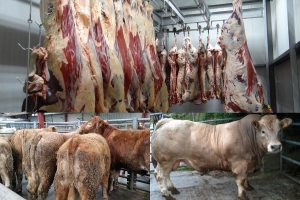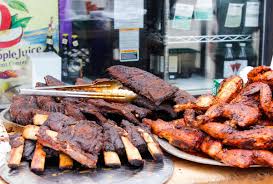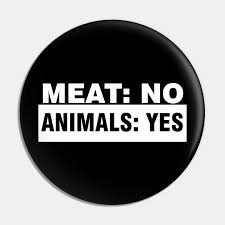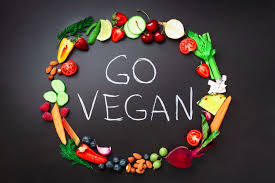Re’ay 2020 – Jews and Their Meat
by devadmin | August 13, 2020 9:53 pm
Jews and Their Meat
Long before, in fact, thousands of years before aspersion were cast and a debate began over whether or not it was ok and kosher to eat meat and or chicken at in Five Fifty and Chimichurri, back in the year 2488, and mamish days before the Yiddin were to enter the Promised Land, the heylige Toirah too weighed in with a statement about eating meat. Back then chicken was still on the parve menu where taka –according to many- it belongs and will one day return.
Welcome to Parshas Re’ay where among the 55 mitzvis Moishe will either review or teach for the first time, we come across this amazing posik in the heylige Toirah which is mamish so givaldig. Says the heylige Toirah (Devorim 12:20), azoy: “When the Lord enlarges your territory, as He has promised you, and you say, ‘I shall eat some meat,’ for you have the urge to eat meat, you may eat meat whenever you wish.” You hear this Raboyseyee? The RBSO is great: He chapped that people have certain desires, especially as they pertain to meat –seemingly of all varieties, if you chap- and gave permission!? Based on this posik, it’s quite poshit: want meat, desire meat? Get yours. But what’s the big deal? What’s the big news in town about permission to eat meat? Nu, before we answer that question, let’s read the following posik which reads azoy: “If the [Beis HaMikdash] will be distant from you, you may slaughter of your cattle and of your sheep, which Hashem has given you, as I have commanded you, and you may eat in your cities, according to every desire of your soul.” The bottom line of what the heylige Toirah tells us is azoy: Enjoy your meat! No restriction on where you may enjoy your meat Case closed? Of course not, as the verses permitting the Yiddin to consume meat as they wish, has two interpretations in the heylige Gemora and dozens of commentaries in other places. Still, what’s the big deal?
We shall get the Gemora soon, ober first this. What? It took until 2448 for the Yiddin to get permission to eat meat? What were they eating until then? Pizza? Soy? Sushi? We chap they ate Munn for kimat 40 years, ober, what menu options were available to them while enslaved for some 210 years? And what were they eating from the time they arrived to Mitzrayim some 400 or 430 years earlier? Was the Yaakov Ovenu family who arrived with but 70 souls all vegetarians? Early vegans efsher? Was chicken available? Charbroiled? Did they or didn’t they eat meat for hundreds of years prior to this week’s instructions? If they didn’t have meat before, how could the Yiddin have recalled the meat they ate in Mitzrayim and complained to Moishe but days later asking for some? Let’s go back and read these words from Parshas Bishalach (16:2-3).
| 2. The entire community of the children of Israel complained against Moishe and against Aharoin in the desert. | בוַיִּלּ֜וֹנוּ (כתיב וילינו) כָּל־עֲדַ֧ת בְּנֵֽי־יִשְׂרָאֵ֛ל עַל־משֶׁ֥ה וְעַל־אַֽהֲרֹ֖ן בַּמִּדְבָּֽר: | |
| 3. The children of Israel said to them, If only we had died by the hand of the Lord in the land of Egypt, when we sat by pots of meat, when we ate bread to our fill! For you have brought us out into this desert, to starve this entire congregation to death | גוַיֹּֽאמְר֨וּ אֲלֵהֶ֜ם בְּנֵ֣י יִשְׂרָאֵ֗ל מִֽי־יִתֵּ֨ן מוּתֵ֤נוּ בְיַד־יְהֹוָה֙ בְּאֶ֣רֶץ מִצְרַ֔יִם בְּשִׁבְתֵּ֨נוּ֙ עַל־סִ֣יר הַבָּשָׂ֔ר בְּאָכְלֵ֥נוּ לֶ֖חֶם לָשׂ֑בַע כִּי־הֽוֹצֵאתֶ֤ם אֹתָ֨נוּ֙ אֶל־הַמִּדְבָּ֣ר הַזֶּ֔ה לְהָמִ֛ית אֶת־כָּל־הַקָּהָ֥ל הַזֶּ֖ה בָּֽרָעָֽב: |
 And let’s not forget these words from Parshas Vo’eschanan (11:4) where we read azoy. “The rabble that was among them desired a desire, and the Bnei Yisrael also wept more, saying, “Who will feed us meat?” They wanted meat! They missed meat implying that they had meat in the past. It epes appears that the Yiddin were enjoying meat long before the RBSO in 2488 gave His consent. We also studied these words “ So Moishe said to Hashem, Where am I to get meat to give to all this people? For they come weeping to me and say, ‘Give us meat to eat!’ But Moishe said, “The people I am with number six hundred thousand on foot; and you say, ‘I will give them meat, that they may eat for a whole month.’ Are there enough flocks and herds to slaughter for them?”
And let’s not forget these words from Parshas Vo’eschanan (11:4) where we read azoy. “The rabble that was among them desired a desire, and the Bnei Yisrael also wept more, saying, “Who will feed us meat?” They wanted meat! They missed meat implying that they had meat in the past. It epes appears that the Yiddin were enjoying meat long before the RBSO in 2488 gave His consent. We also studied these words “ So Moishe said to Hashem, Where am I to get meat to give to all this people? For they come weeping to me and say, ‘Give us meat to eat!’ But Moishe said, “The people I am with number six hundred thousand on foot; and you say, ‘I will give them meat, that they may eat for a whole month.’ Are there enough flocks and herds to slaughter for them?”
What the answers to these questions are, ver veyst, ober according to some, it appears azoy. Seemingly they ate what they wanted, wherever they wanted, meat and chicken –mistama without a hashgocho -from any supervisory agency- until Matan Toirah. In other words: the Yiddin were mistama eating trief mamish in Mitzrayim and before, as there was no rule book. Some will argue that taka they were either vegetarians or early vegans and that’s what the RBSO had intended all along since creation. And their proof? Would our heylige Ovis (forefathers) who avada observed the entire heylige Toirah have eaten treif meat? Or meat not properly slaughtered? Shoin, don’t answer those questions! The bottom line: as stated above, there were no kosher rules before the RBSO revealed them to Moishe orally and while it’s avada nice to imagine that our forefathers observed all they never heard or learned, it might taka be your imagination playing tricks with you. What’s wrong with saying and learning that all this non kosher meat eating took place before Matan Toirah, before rules?
 Moreover, we avada know that marital relations among family members was widely practiced until forbidden post Matan Toirah, and taka we chalk-up certain relationships –like Yaakov marring four of a kind, as in sisters, and a few other relationships we consider taboo in our times, to being permitted before Revelation. Ober back then? Let us recall the Yiddin longing for meat while complaining -even crying- to Moishe. And let us recall our sages -as quoted by Rashi- and who knew more or better- suggesting that their longing was for another type of meat altogether. They cried out for meat, ober what they longed for mamish was the meat of familial relationships which suddenly become verboten. Is there some connection between eating meat and longing for other desires of the flesh? Were we intended to have meat on our menus?
Moreover, we avada know that marital relations among family members was widely practiced until forbidden post Matan Toirah, and taka we chalk-up certain relationships –like Yaakov marring four of a kind, as in sisters, and a few other relationships we consider taboo in our times, to being permitted before Revelation. Ober back then? Let us recall the Yiddin longing for meat while complaining -even crying- to Moishe. And let us recall our sages -as quoted by Rashi- and who knew more or better- suggesting that their longing was for another type of meat altogether. They cried out for meat, ober what they longed for mamish was the meat of familial relationships which suddenly become verboten. Is there some connection between eating meat and longing for other desires of the flesh? Were we intended to have meat on our menus?
Shoin, let’s get back to the present where two of the heylige Ois’s kids have become vegans and at least one argues –regularly- quite vociferously that eating meat is abhorrent and not what the RBSO wants from us. And the shaylo is azoy: may we eat meat? Wherever we so desire? And if yes, why did the RBSO suddenly in this week’s parsha decide to allow meat consumption? What was the circumstance?
Nu, as you already know, when it comes to eating meat –as mentioned above- to also include chicken, and besides the current kosher controversy which is still brewing –and avada you all should be supporting these two glatt kosher restaurants which belong to two great people, many proffered answers to a few of the questions we asked above.
Ober, before we get to the heylige Gemora, the RambaM, Rav kook and efsher others, let us also recall that eating meat is -at times- mamish required by the heylige Toirah. It is? Limoshol, on the first night of Pesach, a person is required to eat an olive’s volume of meat from the Korban Pesach, which comes from either a lamb or a goat. Last I checked, both are considered meat. A person who does not eat from the Korban Pesach warrants Kores mamish, perhaps the most severe punishment in the entire Toirah, in which a person’s soul is somehow “cut off” from the rest of the nation. As opposed to the mitzvah of sukkah, in which people who suffer from extreme heat or cold are excused, there are no waivers with Korban Pesach. Even if eating meat disgusts a person -as it does to my son- he must still eat from the Korban Pesach. Efsher you want to know how much meat is required and what a “volume of olive” is, nu and avada that too is subject to debate where some say that an “olive” is the same size as an olive mamish. Others however assert that an “olive” is the size of a small horse. Shoin.
Let’s learn some Gemora where in Chulin 16a and b, incidentally a tractate the future Ois -while contemplating smicha (rabbinic ordination) back in 1973 before dropping out studied hard, we read this machloikes: Rabbi Yishmoale says azoy: “Scriptures intends none other than to permit them to eat meat which has not been slaughtered for sacrifice; for initially they had been forbidden to eat meat which was not for sacrifice, but once they entered the land such meat became permissible to them. Now that they have been exiled, could it be that the original proscription is again in force? Therefore, the Mishna teaches that ‘Meat may be slaughtered at all times.” Let’s review: there was a time when the Mishkan stood in the Midbar and also when the Beis Hamikdash stood, that meat consumption was only permitted when one offered a korban. A shtikel for the RBSO and a shtikel could be eaten by the korban offeror. The question in the Gemora was whether or not, now that we are devoid of a Beis Hamikdash (as we are in exile) may we still eat meat? Rebbe Yishmoale says yes. Rebbe Akiva has epes a different view which goes azoy: “Scripture intends none other than to proscribe them from eating meat of animals killed by piercing [i.e. by methods other than shechita]; for originally they had been permitted to eat meat animals killed by piercing, but once they entered the land, the meat of animals killed by piercing became forbidden them. Now that they have been exiled, could it be that the original permission is again in force? Therefore the Mishna teaches that ‘Meat may be slaughtered at all times’.”
Let’s review: according to Rebbe Akiva, these verses teach that an animal must be ritually slaughtered in order for it to be considered kosher. Rebbe Yishmael, on the other hand, explains that until this law was given, meat could only be eaten if the animal was offered as a sacrifice. The pisukim in this week’s parsha come to permit the eating of meat from animals that were not consecrated as sacrifices. The first bottom line: permission granted to eat meat as desired. The heylige Gemora refers to such meat as “Bosor Tai’vah” means “eating meat just because it tastes great.”
 Says the Ramban expounding on the explanation of Rebbe Yishmael azoy: When the Yiddin lived in the midbar, nobody lived more than a couple of kilometers from the Mishkan. If a person had a sudden craving for a burger, he could grab a sheep, hop over to the Mishkan, offer a sacrifice, and in a few minutes the burgers would be roasting on the barbeque. Ober over in the Promised Land, people are more dispersed and most live too far from the Beis HaMikdash to offer sacrifices whenever they have a craving for meat.
Says the Ramban expounding on the explanation of Rebbe Yishmael azoy: When the Yiddin lived in the midbar, nobody lived more than a couple of kilometers from the Mishkan. If a person had a sudden craving for a burger, he could grab a sheep, hop over to the Mishkan, offer a sacrifice, and in a few minutes the burgers would be roasting on the barbeque. Ober over in the Promised Land, people are more dispersed and most live too far from the Beis HaMikdash to offer sacrifices whenever they have a craving for meat.
Later in Chulin (84a) we learn azoy: a person is forbidden to arouse in himself the desire for meat (or purchase it regularly) as the Yiddin did at Kivrois-hatta’avah (meaning “graves of craving”), for which they were punished; eating meat is permitted only when a person himself craves meat.
Says Rav Kook, in his book on vegetarianism, “Vision of Vegetarianism and Peace.” (title translated into English) azoy: permission to eat meat implicitly sees the craving of a person for meat as a moral weakness:
 In placing the permission to eat meat after the sanctity of the commandments given at Sinai, the Torah dwelled on the matter at length, saying, “and you say, ‘I shall eat some meat,’ for you have the urge to eat meat, you may eat meat whenever you wish” (Deut. 12:20). This contains a hidden rebuke of Wisdom and an almost imperceptible comment. That is to say, you may eat meat so long as your inner morality is not repulsed at eating the flesh of animals, as you are repulsed at the thought of eating human flesh – which is why the Toirah did not need to forbid this explicitly, since a person does not need to be warned about that which he has already attained a natural morality, for that is equivalent to being explicit. So too, when the time comes that the human moral condition will be so elevated as to be repulsed by animal flesh because of the moral revulsion in it, then you will not have the urge to eat meat and you will not eat it, for the words of the Torah are interpreted “that from the negative you understand the positive and from the positive you understand the negative”[i.e. now you desire to eat meat, but in the future you will not]. The bottom line: Rav Kook is anti-meat.
In placing the permission to eat meat after the sanctity of the commandments given at Sinai, the Torah dwelled on the matter at length, saying, “and you say, ‘I shall eat some meat,’ for you have the urge to eat meat, you may eat meat whenever you wish” (Deut. 12:20). This contains a hidden rebuke of Wisdom and an almost imperceptible comment. That is to say, you may eat meat so long as your inner morality is not repulsed at eating the flesh of animals, as you are repulsed at the thought of eating human flesh – which is why the Toirah did not need to forbid this explicitly, since a person does not need to be warned about that which he has already attained a natural morality, for that is equivalent to being explicit. So too, when the time comes that the human moral condition will be so elevated as to be repulsed by animal flesh because of the moral revulsion in it, then you will not have the urge to eat meat and you will not eat it, for the words of the Torah are interpreted “that from the negative you understand the positive and from the positive you understand the negative”[i.e. now you desire to eat meat, but in the future you will not]. The bottom line: Rav Kook is anti-meat.
Why taka did the RBSO permit meat consumption? It is said in the name of the Ari ( a famous kabbalist in Tzefas) that there is a goal in eating the meat of animals. Primordial man was forbidden to eat meat because the animals then were perfect; but when primordial man sinned, also the animals ate from the Tree of Life and became spoiled. In line with the Ari’s kabbalistic ideas, when people eat meat of animals they raise up out of them all the sparks of sanctity to elevate them to lofty heights. When a person, while eating, directs his intentions to Heaven and intends to fulfill the RBSO’s commandments, he elevates the food that he eats. Bottom line: he’s for meat with certain conditions.
Ober what about eating meat when a mitzvah is not involved? May we eat chulent on shabbis, or enjoy a flieshfest at a bbq? Says Rav Yosef Albo. (Sefer Ha’Ikarim), azoy: the consumption of meat separates man from his emotions and turns him into a cold-blooded killer. His soul becomes hardened and he finds it increasingly difficult to become attuned to holiness. My guess is that he’s against meat consumption.
Another bottom line: when it comes to eating meat, various rabbis weigh, each with their own ideas of why the RBSO gave permission and why we should -even with permission be eating or not eating meat. What to do when different rabbis provide opposite answers? Says the RambaM in Hilchos Yom Tov [6:18], azoy: “[On a holiday] men should eat meat and drink wine, for there is no happiness without partaking of meat, nor is there happiness without partaking of wine. When a person eats and drinks [in celebration of a holiday], he is obligated to feed converts, orphans, widows, and others who are destitute and poor. In contrast, a person who locks the gates of his courtyard and eats and drinks with his children and his wife, without feeding the poor and the embittered, is [not indulging in] rejoicing associated with a mitzvah, but rather the rejoicing of his belly.” While we no longer offer sacrifices, we do have other mitzvis with which to bind the eating of meat, among them shabbis, holidays, and guests. As long as we use meat to elevate our souls and not to degrade them, feel free to fire up the bbq and enjoy the carving station at various simchas.
Rav Kook says we were never meant to eat meat, ober the RBSO in His magnificence chapped that we are weak humans with desires, especially for meat -of every variety, if you chap- and allowed the Yiddin to partake in kosher meat. The RBSO knowing how weak we humanoids are will give in to one more desire, one we will read about in two more weeks. Ober since you crave meat and information today, and given your weakness to hold out, let’s cover it now. In Parshas Ki Teytze the RBSO will allow our fighting soldiers on the battlefield, who happen to eye a beautiful shiksa then causing desires to rage, permission to engage -so to speak-. You hear this? Rashi will tell us that the heylige Toirah allows this but discourages it. He says, “Loi dibra Toirah ela kineged yetzer hara,” meaning that the heylige Toirah takes into account human inclinations. Why the RBSO allowed meat consumption, ver veyst? Was He endorsing, or but giving permission? Ver Veyst but the final bottom line seems to be azoy: one may eat meat.
 Let’s recall George Costanza of Seinfeld fame enjoying a pastrami sandwich to efsher improve his performance while engaging.
Let’s recall George Costanza of Seinfeld fame enjoying a pastrami sandwich to efsher improve his performance while engaging.
A gittin Shabbis-
The Heylige Oisvorfer Ruv
Yitz Grossman
Source URL: https://oisvorfer.com/reay-2020-jews-and-their-meat/
